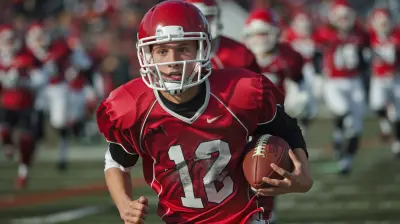6 January 2025
Coaching has always played an integral role in the world of sports. But in today’s age, it’s more than just about winning games or developing athletes’ physical abilities. Coaches have the power to influence far beyond the playing field. They can shape communities, break down societal barriers, and foster character development in players that stretches into all areas of life. Coaching for social impact is about using your platform to create positive change, not just in the game but in society at large.
Curious about how coaching can go beyond the field and impact the world? Let’s dive in.

The Traditional Role of a Coach
Traditionally, a coach’s role has been to guide, teach, and motivate athletes to perform better in their respective sports. Whether it was perfecting a jump shot, running faster, or mastering a particular technique, the focus was often on measurable results. Wins and losses became the ultimate indicators of success.And hey, there’s nothing wrong with wanting to win — that’s the nature of sports, right? But there’s more to coaching than just tallying up victories. Coaches have a profound influence on their athletes, shaping not only their physical abilities but also their mental and emotional development.
In fact, if you think about it, the lessons learned on the field often mirror those in life: teamwork, resilience, perseverance, and discipline. But what if we took it a step further? What if coaches intentionally used their influence to drive social change? That’s where the concept of coaching for social impact comes into play.

What Does "Coaching for Social Impact" Mean?
Let’s break it down. Coaching for social impact means leveraging the coach’s role to make a difference beyond sports. It’s about using your position to advocate for broader societal issues, mentor players in a way that transcends the game, and create an environment where athletes learn not just how to win, but how to be better human beings.It’s not just about success on the scoreboard. It’s about success in life. This could mean:
- Promoting inclusivity and diversity in sports.
- Encouraging community engagement and volunteer work.
- Instilling values like empathy, respect, and integrity.
- Addressing social issues like mental health, poverty, or racial inequality.
In short, it’s about using the power of sports as a vehicle for change.
A Broader Scope: Beyond the X's and O's
When we talk about coaching for social impact, we’re expanding the scope of what it means to be a coach. No longer is it just about strategy, drills, and game plans (the X's and O's of coaching). Instead, it’s about embracing a holistic approach that fosters personal and societal growth.Think about it this way: a coach can be a mentor, a role model, and an advocate. They have the unique ability to reach young athletes during their formative years when they are most impressionable. A coach who emphasizes social responsibility and personal development can leave a lasting impact, one that resonates far beyond the final whistle.
The Ripple Effect: Sports as a Microcosm of Society
Sports have always been a reflection of society. Just like the world outside, sports teams are made up of individuals from different backgrounds, beliefs, and perspectives. A coach who understands this dynamic has the opportunity to foster unity, respect, and understanding among players, which can then radiate out into the greater community.In essence, sports can serve as a microcosm of society, and coaches are the leaders who can shape it. By addressing social issues within their teams, coaches can create a ripple effect that leads to broader societal change.

Key Areas Where Coaches Can Drive Social Impact
Now, you might be wondering: what are some tangible ways coaches can make a difference? Let’s explore a few key areas where coaches can drive social impact:1. Promoting Diversity and Inclusion
One of the most powerful ways coaches can create social change is by fostering an inclusive environment. Sports should be a place where everyone — regardless of race, gender, socioeconomic background, or ability — feels welcome and valued.Coaches can:
- Encourage diversity within their teams by actively recruiting players from different backgrounds.
- Create an environment where every player feels heard and respected.
- Address issues of discrimination or bias head-on, both within the team and the broader sports community.
By promoting diversity and inclusion, coaches not only build stronger teams but also send a powerful message about the kind of society we should all strive to create.
2. Empowering Athletes to Be Leaders in Their Communities
Coaches have the ability to inspire athletes to take on leadership roles, both on and off the field. By emphasizing the importance of community engagement, coaches can encourage athletes to use their platform to make a difference.For example:
- Getting athletes involved in community service projects.
- Encouraging players to mentor younger athletes or work with underprivileged youth.
- Supporting athletes who want to speak out on social issues like mental health, racial injustice, or environmental sustainability.
When athletes see their coach leading by example, they’re more likely to follow suit and take action in their own communities.
3. Mental Health Advocacy
Sports can be a source of immense pressure for athletes, particularly at the elite level. Coaches who prioritize mental health can make a significant social impact by fostering a culture of openness and support.Here’s how coaches can advocate for their athletes' mental well-being:
- Educating athletes about the importance of mental health care.
- Encouraging players to seek support when they need it, whether through a counselor, therapist, or trusted mentor.
- Creating an environment where athletes feel comfortable discussing their struggles without fear of stigma or judgment.
By normalizing conversations around mental health, coaches can help dismantle the stigma that often surrounds it, both in sports and society.
4. Teaching Life Skills That Transcend Sports
At the end of the day, most athletes won’t go on to play professionally. But the life skills they learn through sports can serve them for years to come. Coaches who intentionally teach these life skills are setting their players up for success beyond the field.Examples of life skills coaches can emphasize include:
- Resilience: Bouncing back from failure is a critical skill, both in sports and in life.
- Teamwork: Collaborating with others is essential in any setting, from the workplace to personal relationships.
- Time management: Balancing sports, academics, and other commitments teaches discipline and organization.
- Leadership: Taking initiative and leading by example are skills that will benefit athletes in any future career.
By focusing on these broader life lessons, coaches can help develop well-rounded individuals who are equipped to make a positive impact in the world.

Real-World Examples of Coaching for Social Impact
So what does this look like in action? Let’s take a look at a few real-world examples of coaches who are leading beyond the field:1. Gregg Popovich – Speaking Out on Social Justice
San Antonio Spurs coach Gregg Popovich is known for his outspoken stance on social justice issues. He’s used his platform to address racial inequality, advocate for voting rights, and speak out against systemic injustices in the U.S. Popovich’s leadership extends beyond basketball, as he encourages his players to be informed, engaged citizens who use their voices for positive change.2. Dawn Staley – Empowering Women in Sports
Dawn Staley, the head coach of the South Carolina Gamecocks women’s basketball team, is a trailblazer for women in sports. Not only has she led her team to multiple national championships, but she’s also been a vocal advocate for gender equality in athletics. Staley empowers her players to break barriers and challenge societal norms, both on and off the court.3. Steve Kerr – Advocating for Gun Control
Golden State Warriors coach Steve Kerr has been an outspoken advocate for gun control legislation. After losing his father to gun violence, Kerr has used his platform to push for meaningful policy changes. His advocacy has inspired his players to speak out on the issue, demonstrating the power of using sports to drive social change.The Lasting Impact of Coaching for Social Change
At the end of the day, coaching for social impact isn’t about neglecting the on-field performance. It’s about recognizing that the lessons learned in sports can carry over into life. Coaches who embrace this broader role have the ability to shape not only great athletes but great leaders, citizens, and agents of change.So, whether you’re coaching a youth soccer team or leading a professional basketball squad, remember: your influence goes far beyond the game. You have the power to inspire, guide, and create a lasting impact — both on the field and in the world.
Conclusion: Ready to Lead Beyond the Field?
Coaching for social impact is about leading with intention. It’s about recognizing the broader role you play in shaping not just athletes but individuals who can contribute to society in meaningful ways. By promoting diversity, advocating for mental health, teaching life skills, and fostering leadership, coaches have the ability to make a lasting difference.So, the next time you step onto the field, ask yourself: How can I lead beyond the game?












Naya Morales
This article beautifully highlights the profound impact coaches can have beyond the game. Their leadership shapes not just athletes, but communities, fostering growth and resilience in ways that truly matter.
March 12, 2025 at 1:12 PM